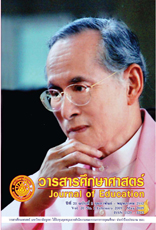Intercultural Competence Needs of Managers in International Automotive Companies in the Eastern Seaboard of Thailand
คำสำคัญ:
ทักษะความสามารถ, วัฒนธรรม, ความเชื่อทางด้านวัฒนธรรมของชนชาติต่างๆ, ความหลากหลาย, Competency, Culture, Multiculturalism Diversityบทคัดย่อ
ในศตวรรษที่ 21 ผู้นำส่วนใหญ่ตระหนักถึงความสำคัญของยุคโลกาภิวัฒน์ โลกที่ไร้พรมแดนก่อให้เกิดการเปลี่ยนแปลงด้านแรงงาน ผู้นำของนานาประเทศจึงเริ่มเห็นความสำคัญและจำเป็นในด้านความรู้ ความเข้าใจระหว่างประเทศต่างๆในโลก ทั้งนี้เพื่อให้ประชากรโลกได้มีโอกาสเลือกทำงานตามที่ถนัดและสนใจในที่ทำงานทั้งในประเทศและต่างประเทศ
ดังนั้นความรู้ความเข้าใจในด้านวัฒนธรรมของชนชาติต่างๆจึงกลายเป็นสิ่งสำคัญยิ่งในยุคโลกาภิวัฒน์ ด้วยเหตุดังกล่าวทักษะความสามารถซึ่งเป็นสิ่งที่ยากแก่การให้คำจำกัดความนั้นอาจรวมไปถึงเจตคติ ค่านิยม ความรู้และองค์ประกอบอื่นๆมากมาย ทักษะความสามารถคือสิ่งที่นำไปสู่ผลงานที่ดี ผู้วิจัยจึงเห็นว่า การขาดทักษะความสามารถด้านวัฒนธรรมระหว่างชนชาติต่างๆอาจเป็นปัญหาต่องค์กร โดยเฉพาะที่ประกอบด้วยพนักงานจากชนชาติต่างๆ มาทำงานร่วมกัน ไม่ว่าจะเป็นประเทศไทยหรือประเทศอื่นๆที่กำลังก้าวเข้าสู่โลกที่ไร้พรมแดน วัตถุประสงค์ของการศึกษาครั้งนี้คือการเสนอองค์ประกอบของทักษะความสามารถของผู้จัดการที่ทำหน้าที่บริการใหคำปรึกษาเพื่อการศึกษาวิธีการที่จะนำไปสู่ประสิทธิภาพในการทำงาน และบอกให้รู้ว่าอะไรคืออุปสรรคที่องค์กรกำลังเผชิญอยู่ การศึกษาครั้งนี้ผู้วิจัยได้สัมภาษณ์พนักงานจำนวน 9 คน ที่ทำงานในบริษัทรถยนต์ในบริเวณอีสเทิร์น ซีบอร์ด ประเทศไทย ผู้วิจัยใช้การเก็บข้อมูลการสัมภาษณ์แบบเชิงลึก และกึ่งรูปแบบ ข้อมูลที่ได้จากการสัมภาษณ์สรุปโดยการบรรยายจากการให้สัมภาษณ์ซึ่งประกอบด้วยประเด็นต่างๆ 9 ประเด็นดังนี้ ทักษะความสามารถของผู้จัดการ การสร้างทีมงาน ปัญหาที่องค์กรกำลังเผชิญอยู่ ปัจจัยที่จะนำไปสู่ความสำเร็จขององค์กรที่ประกอบด้วยพนักงานจากชาติต่างๆ วัฒนธรรมและวิธีการทำงานของชาติต่างๆที่ทำงานในประเทศไทย ประการสุดท้ายผู้วิจัยได้นำเสนอรูปแบบการพัฒนาองค์กรการจัดสภาพแวดล้อมที่เอื้อต่อองค์กรที่มีพนักงานจากชาติต่างๆทงานร่วมกัน และยังได้เสนอแนะความคิดเห็นเพื่อการศึกษาวิจัยต่อไป
Abstract
In the 21st century leaders have realized the importance of globalization. Due to the changing workforce. Nowadays, leaders have become aware of the need for across-cultural understanding, so that people can work positively whether locally or globally. Thus, cross-cultural knowledge will become ever more important in out era of globalization. Accordingly, competency is a difficult concept and encompasses attitudes, values, knowledge, and some other factors which lead to an incredible job performance. Thus, the researcher viewed that the lack of intercultural competencies might be a barrier in multicultural organizations in Thailand, as well as to those who have the potential to become global. The purposes of this article, are to identify the competencies required for managers of intercultural consultancy services; to investigate ways which allow diversity to work effectively; and to identify barriers confronted by different cultures in international companies. Interviews were conducted with nine participants in four international automotive companies in the Eastern Seaboard of Thailand. Data were collected from the in-depth, semi-structures interviews of the participants. The findings were constructed by providing a comprehensive description of the setting. It is consisted of nine issues as followed: managers’ competencies, team building for diversity, barriers confronted by differences in culture, successful intercultural environment, foreigners, cultures and working styles in Thailand, adaptability, communication skills, management issues, and educating foreigners the others’ cultures in Thailand. Ultimately, the research attempted to develop a model for an intercultural work environment, as well as succinct recommendations for further researches.
ดาวน์โหลด
เผยแพร่แล้ว
รูปแบบการอ้างอิง
ฉบับ
ประเภทบทความ
สัญญาอนุญาต
ลิขสิทธิ์ของบทความที่ปรากฏในวารสารศึกษาศาสตร์ มหาวิทยาลัยบูรพา เป็นของวารสารศึกษาศาสตร์ มหาวิทยาลัยบูรพา ทั้งนี้บทความทุกเรื่องผ่านการตรวจสอบความถูกต้องทางวิชาการจากผู้ทรงคุณวุฒิ ข้อความและข้อมูลของบทความในวารสารฯ เป็นแนวคิดของผู้แต่ง มิใช่เป็นความคิดเห็นของกองบรรณาธิการ และมิใช่ความรับผิดชอบของคณะศึกษาศาสตร์ มหาวิทยาลัยบูรพา ไม่สงวนลิขสิทธิ์การนำไปใช้ประโยชน์ทางวิชาการแต่ต้องอ้างอิงแสดงแหล่งที่มาและอยู่ในขอบเขตของกฎหมายลิขสิทธิ์



